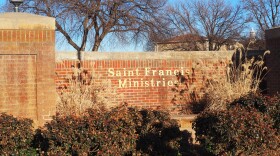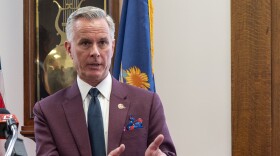A northeast Kansas school board has taken wide-ranging action against books that mention nudity, gender identity, sexual orientation, sexuality and other topics, a move critics say is meant to target LGBTQ+ books, but may impact a wide scope of educational materials in the district.
The Leavenworth School District Board of Education voted 4-3 on Monday to pass revisions to an education policy that bans “gender identity” and “sexual orientation” references in the district’s elementary library books, despite objections from parents and students in the district.
“This policy is just a backhanded way to continue attacking members of the LGBTQ community and their allies by suggesting no age is appropriate to recognize the very existence of a portion of our student body and society,” said Leavenworth resident Eric Price during the Monday board meeting.
“Don’t be surprised when you get complaints about everything from Shakespeare to the Bible,” he added.
The policy states elementary curriculum and other materials should not contain any visual or written description of sexual acts, implied nudity or visual depiction of nudity. The policy also states that “no materials in elementary libraries shall contain materials referencing or providing instruction on gender identity or sexual orientation.”
Under this broad criteria, stories such as “The Emperor’s New Clothes” wouldn’t be allowed, as well as books featuring LGBTQ+ characters.
When asked if this broad wording could subject all books at the elementary level to scrutiny and potential removal, district spokesman Jake Potter said he couldn’t speak to the specific language of the policy.
“As I read it and interpret it, it does appear that it’s more restrictive at the grade levels, at the younger levels, and gets a little less restrictive as it gets to young teen and young mature audiences of middle school and high school,” Potter said.
A transgender Leavenworth High School student who spoke during the board meeting said he felt “utterly disappointed and let down by our elected leaders.”
“I sit in this desk every day, seven hours a day, five days a week,” the student told the board. “I hope that you all realize tonight that you are on the wrong side of our school’s history and our country’s history.”
At the middle school level, the policy bars visual and written depictions of sexual acts and visual depiction of nudity, except for classical works of art and educational health and science diagrams.
At the high school level, the policy states curriculum and other media collections should not contain written or visual depictions of sexual acts or “simulations of such acts.”
Potter acknowledged the new language could increase the number of book challenges in the district. He said the biggest impact of the revised policy would likely be increased scrutiny on future library book purchases.
The policy was supported by departing board member Mike Powell, who previously has spoken against Scholastic book fairs because he believes they promote “sexualized content.”
Leavenworth resident Brandi Bond, who has been a parent in the district for more than 20 years and formerly served as a library aide for the district, said the policy put the district in a bad light.
“We’ve told a whole group of students that they don’t deserve representation in their libraries, that they don’t deserve to see characters that reflect who they are, that they don’t deserve to have their stories told,” Bond said.
In the past year, book challenges because of LGBTQ+ content have plagued libraries and schools nationally and locally.
In St. Marys, LGBTQ+ children’s books were taken off shelves. Republican lawmakers in the Legislature have announced their intent to remove “woke” and “sexualized content,” a talking point that critics said has been used to encourage skepticism of classroom instructional materials and incite book bans. State Board of Education member Danny Zeck railed against “smut,” using LGBTQ+ books such as “Rick,” a book about an asexual middle-schooler, as examples of material that parents need to be warned about.
“Censorship in school libraries is meant to control what our young people can know and learn. Students deserve better,” said Kansas Library Association President Sean Bird. “Students deserve to be able to voluntarily seek information to discover the world around them.”
“There has been an epidemic of book banning across the nation over the past couple of years, and Kansas is not immune,” he added.
This story was originally published by the Kansas Reflector.
Copyright 2023 KCUR 89.3. To see more, visit KCUR 89.3. 9(MDA4OTAxNzAzMDEzMjc0MTc2MzA5ZDZlMw004))







